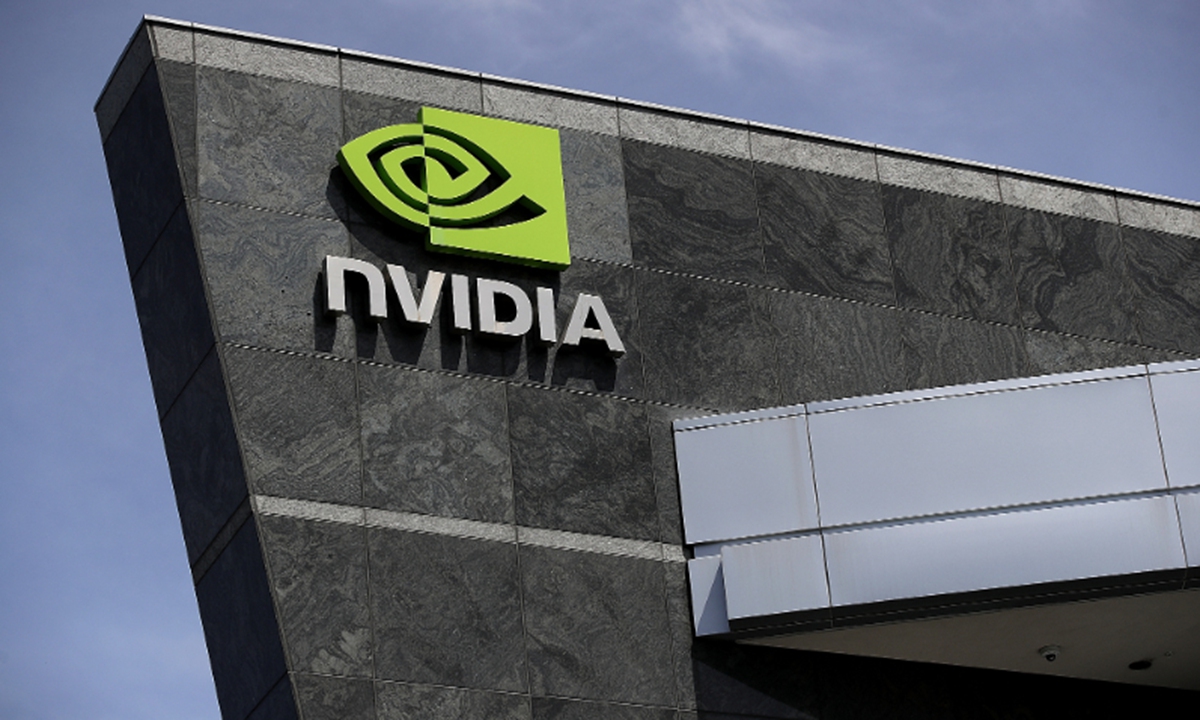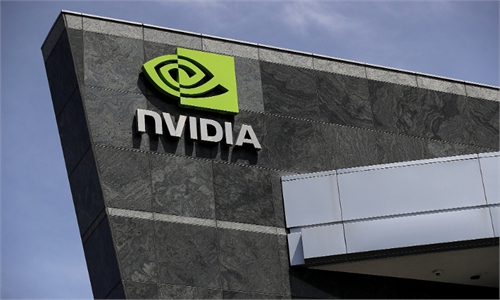Nvidia’s pragmatic approach to Chinese market is worth Washington’s reflection: Global Times editorial

Photo: VCG
US chipmaker Nvidia saw a significant increase in its stock price and market value after its impressive financial report for the fourth quarter of 2023, and its single day market value increase set a new record in Wall Street. However, despite the seemingly rosy outlook, Nvidia has to put its attention and resources on addressing a major concern: a sharp decline in revenue in China due to the escalating US restrictions on chip exports to China.
On the day when its financial report was released, Nvidia CEO Jensen Huang revealed to the media that the company is currently offering customers samples of its two new artificial intelligence chips aimed at the Chinese market and is looking forward to customer feedback on it. This statement comes after Nvidia was twice forced to design and produce chips specifically for the Chinese market to circumvent US export controls. The previous "downgraded" chips failed to gain traction in China.
Nvidia is making significant efforts and showing great dedication to retaining the Chinese market. Nvidia's emphasis on the Chinese market stems from a rational business and market-oriented mind-set. Losing a market that once accounted for one-fifth of its revenue would be unbearable even for Nvidia, which has been crowned the "AI king" by the market. Huang has repeatedly emphasized that "There is no other China, there is only one China." Previous analyses from Wall Street have also pointed out that the biggest risk to Nvidia's bright prospects lies in China. In this regard, Nvidia, being grounded in the market, must demonstrate a more pragmatic attitude compared with Washington politicians.
Nvidia's success today is largely due to its market savvy and understanding of where its market and future lie. While we hope Nvidia can achieve success in achieving mutually beneficial cooperation with China in the field of technology within the constraints of US policies, Nvidia is well aware that no major market will simply wait for it to come up with a solution.
As the US government sets up multiple barriers in order to promote a technological "decoupling" from China, China's independent technological innovation is accelerating. The "downgraded" version of Nvidia's chips faces a tepid response in the Chinese market, influenced both by grudging Chinese customers and the progress made in China's independent replacement of chips.
According to media reports, Nvidia recently, for the first time, listed Huawei as a major competitor in a number of areas, including in the crucial production of processors that power artificial intelligence (AI) systems, in documents submitted to the US Securities and Exchange Commission. Nvidia has not yet commented on this. We would like to say, firstly, that this can be viewed as a high recognition by Nvidia of Huawei's progress in the field of AI chips; secondly, this once again shows that political interference like building "small yards and high fence" for high-tech industries is often counterproductive and cannot stop China's independent innovation. We urge Nvidia and other US companies to respond to the competition from Chinese counterparts with an open, inclusive, and healthy attitude. We believe Nvidia can achieve this, as it contributes to a positive industry ecosystem.
In terms of Nvidia's approach to the Chinese market, what is more thought-provoking is the prominent situation in new sectors requiring extensive infrastructure development, where demand surpasses supply. The key lies in realizing the significant improvement in productivity and economic growth through more practical applications and scenario setups for AI. Washington, by continually applying a zero-sum game logic in the political arena, is subtracting from the substantial development of Nvidia and the AI era. In contrast, Nvidia is pragmatically adding value through market forces.
As a victim of the US' export control policies, Nvidia should continue to collaborate with other American tech companies to exert pressure on and influence Washington in various ways, urging the swift repeal of policies and measures that violate international trade principles and rules. The AI wave is upon us, and the world evidently needs visions and ideas that align with this era. Countries should focus on promoting overall productivity growth through intense but beneficial competition, rather than reinforcing their monopoly positions and suppressing potential competitors through misguided policies or even those that violate fair trade rules.
We welcome Nvidia's participation in the competition in the Chinese market and believe that this market is expansive enough to accommodate both Nvidia and innovative Chinese enterprises. How foreign enterprises' future path develops - whether it widens or narrows - to a certain extent depends on establishing a sustainable and positive relationship with the Chinese market. Nvidia's attitude toward the Chinese market will also determine whether it can truly emerge as a leading company in the era of AI.

